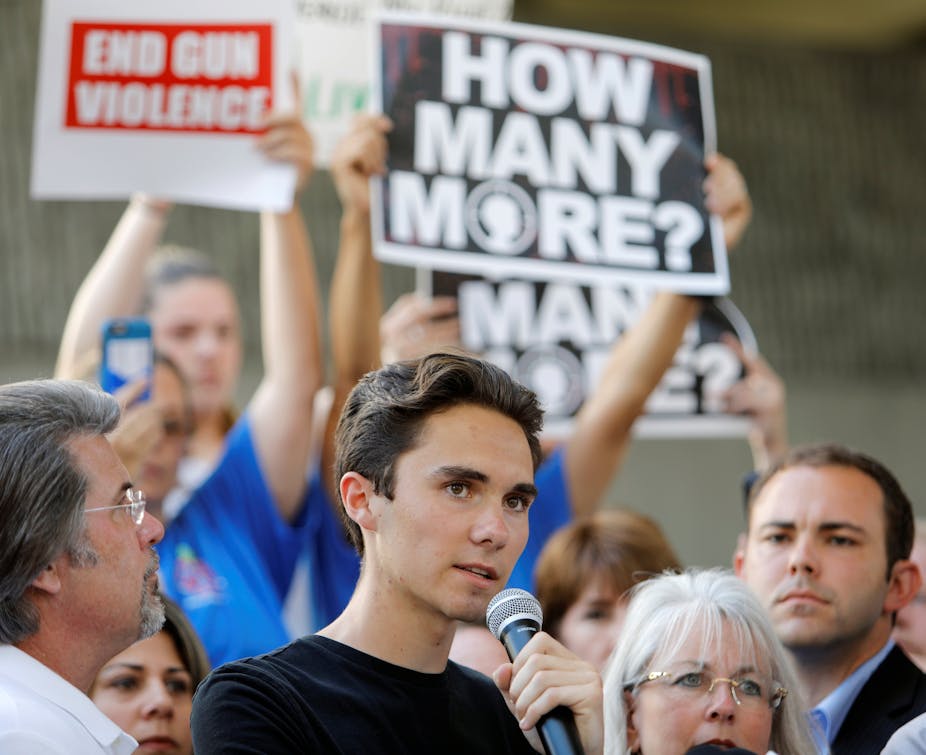Over the past few days, accusations have surfaced that student survivors of the Florida incident – which saw 17 people lose their lives – are in fact performers playing a pre-written role for the cameras.
Since the shooting the students and survivors have rallied together to organise marches and protests, and have been outspoken in their criticism of gun control in the US. The students have also formed a group, #NeverAgain.
But across various social media platforms, teenage victims have been dubbed “crisis actors”. They have been accused of secretly working on behalf of gun control campaign groups, or being coached by the FBI. An aide to a Republican state representative also lost his job last week after he emailed a news reporter with misinformation suggesting some students were paid actors.
Cameron Kasky, one of the teenagers leading the way for stricter background checks on gun consumers, denies the claims stating: “If you had seen me in our school’s production of Fiddler on the Roof, you would know that nobody would pay me to act for anything.”
Why the conspiracy theories?
Two things are happening here: a long history of what theatre scholarship calls “the anti-theatrical prejudice” – which presumes the art of acting and deceiving go hand in hand. And the pervasive idea that children can (and should) be moulded and shaped according to an adult agenda.
This deeply ingrained way of viewing drama in Western culture can be traced as far back as the ancient Greek philosopher Plato who doubted the imitative qualities of performance to faithfully represent reality.
Ironically, what the labelling of these young people as “crisis actors” foregrounds is the importance of their theatrical background to their political activism. Emma González, another key figure in the movement, acknowledges the close relation between theatre and politics when she says: “All these kids are drama kids, and I’m a dramatic kid, so it really meshes well.”
Meanwhile, Michael Schulman of The New Yorker likened the situation to Spring Awakening, a musical by Duncan Sheik and Steven Sater which is about:
What happens when neglectful adults fail to make the world safe or comprehensible for teenagers, and the onus that neglect puts on kids to beat their own path forward.
In an example of art imitating life, student Kasky’s recent twitter feed suggests he is currently rehearsing the lead in a production of the musical, which is based on a 19th-century play by German playwright Frank Wedekind.
Time for activism
As a theatre and performance scholar, it didn’t surprise me to learn that many of these young people and their supporters are studying drama. I was left in no doubt by their confident articulations, their theatrical references to plays about social change and their ability to recognise the symbolic power of performative actions – such as the recent protests which featured 17 students laying down for three minutes outside the White House.
But what is most striking is that their presence on the world stage is a stark reminder that this is in fact a moment of crisis – and it is children who are taking action.
In this way then, these students are not only actors but “crisis actors” of a different kind. A kind that calls back to the Latin origins of the term “actor” as an agent or doer. They are doing something. And through their words and deeds, these young activists are bravely reclaiming the term “crisis actor” from those who want to use it to downplay their authenticity.
In the time since the fateful day on February 14, the group has significantly increased pressure on the National Rifle Association (NRA) with protests, marches and televised debates with politicians, NRA representatives and law enforcement officers. As a result of this action, major car and rental insurance companies have already stopped doing business with the NRA.
The voices of children
In a forthcoming issue of Taylor and Francis’ Performance Research journal which I’m co-editing with The Institute for the Art and Practice of Dissent at Home, we consider how children can occupy the position of collaborator, performer, artist, researcher and activist at one and the same time. This is seen in the performance work of Germany and Canada-based performance company Mammalian Diving Reflex among many others.
The research we’ve compiled – some of which was “peer-reviewed” by children who took an active role on the journal issue’s editorial team – shows that, with performance on their side, children can exercise their own agency to shake up political and cultural norms. This is despite the notion that children are not yet fully formed humans.

So while Donald Trump sits in a more traditional theatrical role, clutching his pre-prepared “I hear you” script at a meeting with Florida survivors last Wednesday, perhaps it’s no wonder that young people are growing impatient with the adult response to simply “hear” but not necessarily listen.
The urgency of their call for change is not only a timely reminder of the value of an arts-based education in paving the way for political engagement and civic duty. But also the pressing need to take action in a world where we’re not short of crises. We’ve given adults a chance, so perhaps now is the time for children to act.

